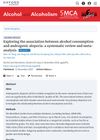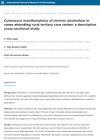
Plant-based compounds can improve wound dressings and skin medication delivery.
 July 2023 in “International Journal of Cosmetic Science”
July 2023 in “International Journal of Cosmetic Science” Biopolymers are increasingly used in cosmetics for their non-toxicity and skin benefits, with future biotech advancements likely to expand their applications.
 May 2023 in “Endocrine, metabolic & immune disorders”
May 2023 in “Endocrine, metabolic & immune disorders” Hibiscus rosa-sinensis is used in traditional medicine and is safe in high doses, with various health benefits.
[object Object]  August 2022 in “Metabolites”
August 2022 in “Metabolites” Different types of skin on mice have unique chemical profiles related to how they grow and react to stress.
 April 2022 in “Molecules”
April 2022 in “Molecules” Teak leaf extract contains compounds that could help treat hair loss.
 November 2017 in “International journal of family & community medicine”
November 2017 in “International journal of family & community medicine” A man's low testosterone and related symptoms improved after he stopped taking hair loss drugs.
 April 2011 in “한국생물공학회 학술대회”
April 2011 in “한국생물공학회 학술대회” Lotion with fucoidan from brown seaweed improved skin and reduced allergy symptoms in mice with dermatitis.
March 2008 in “British Journal of Pharmacology” Enzymes play crucial roles in metabolism, health, and disease management.

Intermittent fasting slows hair growth by damaging hair follicle cells.
May 2023 in “Journal of Cosmetic Dermatology” Androgenetic alopecia is linked to higher cardiovascular and metabolic risks, possibly due to irisin resistance.
January 2023 in “Pharmaceutics” AA–TF#15 significantly promotes hair regrowth and could be an effective treatment for androgenic alopecia.
63 citations,
April 2017 in “Acta psychiatrica Scandinavica” Higher prenatal and adult androgen levels are linked to alcohol dependence and withdrawal severity.
 27 citations,
June 2013 in “Alcoholism: Clinical and Experimental Research”
27 citations,
June 2013 in “Alcoholism: Clinical and Experimental Research” Finasteride use may lead to less alcohol consumption in men with lasting sexual side effects.
 19 citations,
January 2009 in “Journal of Young Pharmacists”
19 citations,
January 2009 in “Journal of Young Pharmacists” Alcoholic extract of Eclipta alba may help treat allergies and is safe at high doses.
14 citations,
September 2017 in “Hormones and behavior” δ-GABAA receptors affect alcohol consumption based on the estrous cycle and influence movement regardless of the cycle.
 12 citations,
January 2013 in “Alcohol and Alcoholism”
12 citations,
January 2013 in “Alcohol and Alcoholism” Alcohol in teen years leads to more adult drinking, finasteride doesn't help.
 9 citations,
February 2022 in “Biomolecules”
9 citations,
February 2022 in “Biomolecules” Drinking a lot of alcohol increases the risk of prostate cancer and can worsen the condition.
 6 citations,
December 2019 in “BMC Complementary and Alternative Medicine”
6 citations,
December 2019 in “BMC Complementary and Alternative Medicine” Alcohol extract from Vernonia anthelmintica seeds may help treat stress-related hair loss.
4 citations,
July 1948 in “Experimental biology and medicine” Alcohol extraction lowers casein's nutrition, causing slower growth and hair loss in rats.
1 citations,
April 2019 in “The Journal of urology/The journal of urology” Marijuana use is linked to higher chances of needing treatment for urinary symptoms in men over 40.
 1 citations,
January 2019 in “Elsevier eBooks”
1 citations,
January 2019 in “Elsevier eBooks” Neuroactive steroids may affect the risk and treatment of alcohol use disorders.
[object Object]  September 2024 in “Alcohol and Alcoholism”
September 2024 in “Alcohol and Alcoholism” Alcohol may slightly increase the risk of hair loss, but the link is uncertain.
 February 2024 in “International Journal of Research in Dermatology”
February 2024 in “International Journal of Research in Dermatology” Alcohol-free minoxidil 5% is effective and safe for treating male pattern hair loss.
 July 2022 in “International journal of dermatology, venereology and leprosy sciences”
July 2022 in “International journal of dermatology, venereology and leprosy sciences” More frequent and severe skin problems are linked to higher daily alcohol consumption.
 June 2021 in “International Journal of Research in Dermatology”
June 2021 in “International Journal of Research in Dermatology” Half of the people with alcohol dependency in the study had liver disease and skin issues like seborrheic dermatitis, which are important signs of alcohol abuse.
May 2019 in “Eurasian Journal of Biosciences” Fenugreek aqueous extract is more effective against acne bacteria than the alcoholic extract.
January 2023 in “International Journal of Trichology” Alcohol-free minoxidil is better for treating hair loss in Indian men.
 April 2020 in “Dermatology and therapy”
April 2020 in “Dermatology and therapy” New 5% minoxidil solution improves scalp hydration, reduces redness, and may be safer for sensitive users.
 119 citations,
November 2009 in “Human Reproduction”
119 citations,
November 2009 in “Human Reproduction” Women with PCOS and higher androgen levels are more likely to have fatty liver disease.
38 citations,
May 1971 in “Clinical genetics” A specific metabolite, not a receptor protein, triggers the production of certain kidney enzymes, but this process is disrupted in mice with a mutation causing testicular feminization.




















